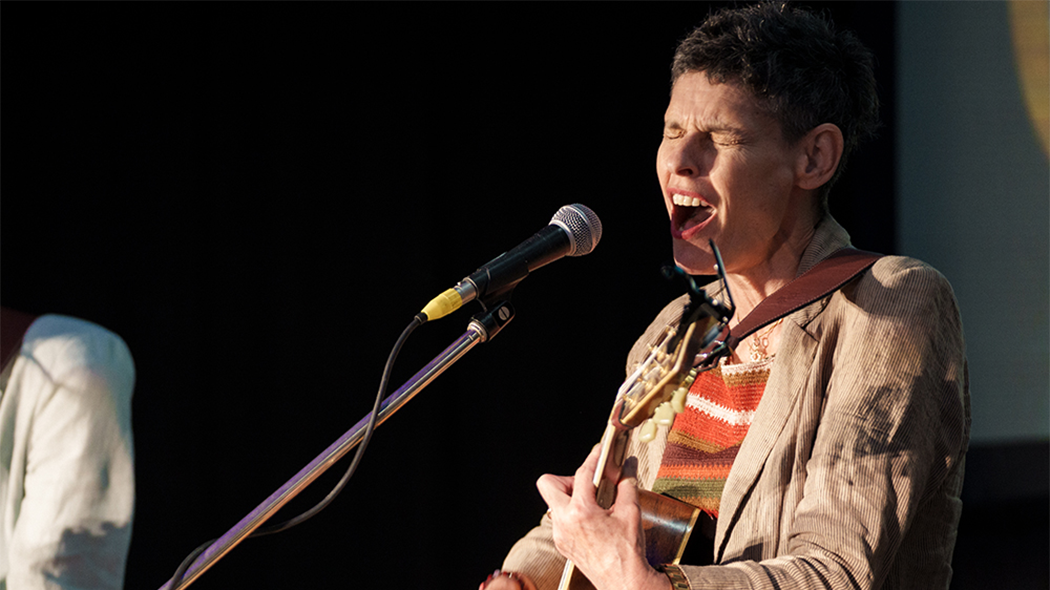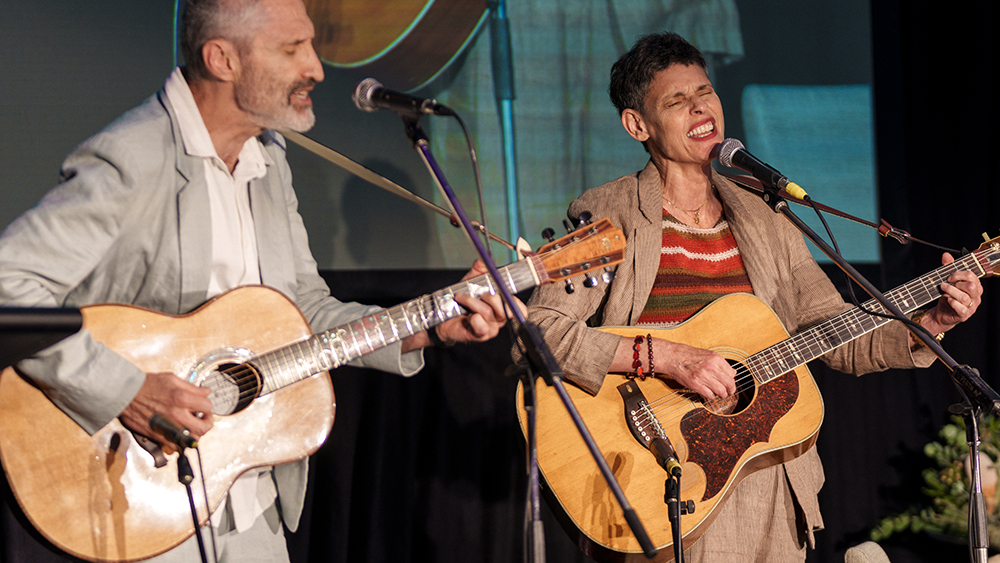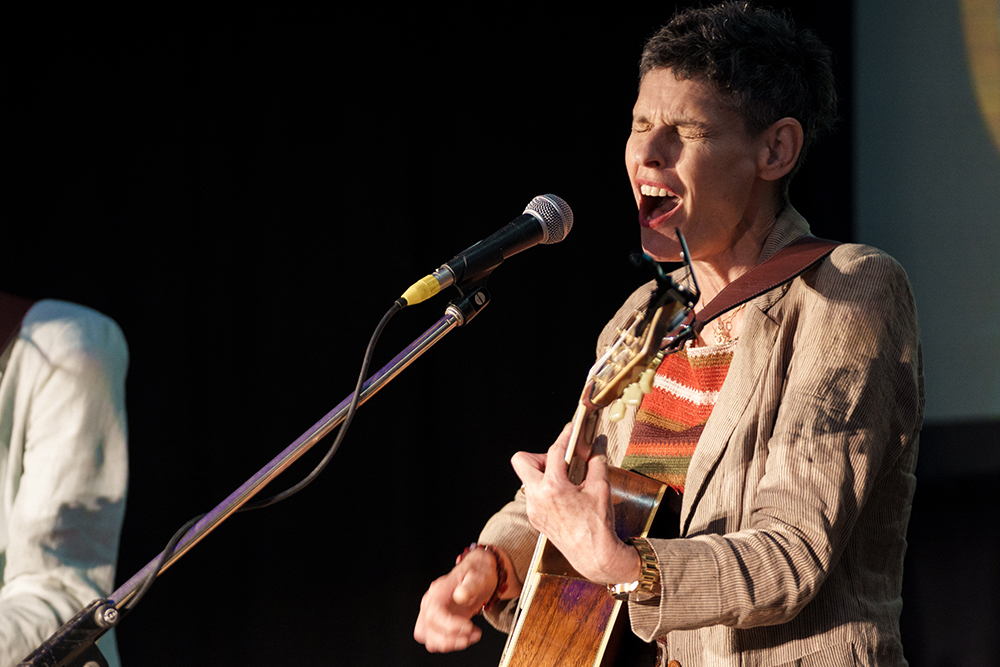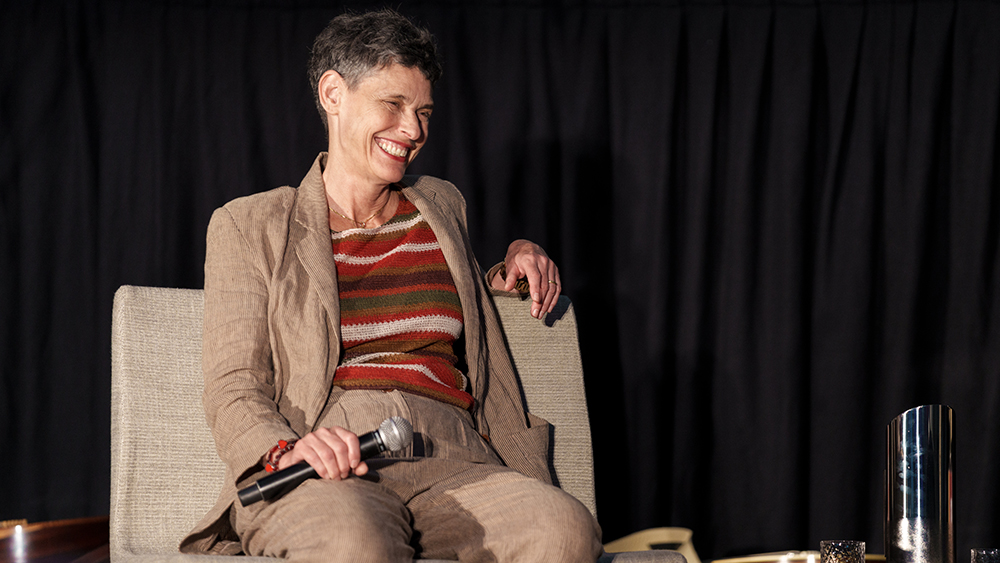
Review: Deborah Conway & Willy Zygier at State Library of Western Australia
Deborah Conway & Willy Zygier at State Library of Western Australia
Friday, February 23, 2024
Deborah Conway has written a memoir, The Book of Life. The sardonic songstress with the big voice has finally spilled the beans on her extraordinary career at the pinnacle of Australian pop music. To celebrate its release and sell a few copies, she has taken to the writers festival circuit. Last Friday, she was the opening night guest for Perth Festival’s Writers Weekend.
Her attendance was not without controversy. As the long queue snaked the concourse in front of the Alexander Library, a group of protesters quietly handed out pamphlets. In light of Conway’s broadcast comments about the war in Gaza, they questioned her inclusion in the weekend’s program. Given that the point of writers festivals is to foster debate about controversial issues and present conflicting views so that people can better appreciate the complexity of the modern world, their call was mildly ironic. To fulfil the brief, such events cannot preclude people because they hold a divergent view. Besides, Conway was scheduled to talk about her music career, not her views on Gaza.
In the end, she was a good guest and didn’t raise the issue. Neither did Perth’s preeminent music journalist, Simon Collins, who interviewed her. Instead, she gave a witty and entertaining summary of her memoir, book-ending and breaking it up with four songs performed alongside her long-term partner in music and life, the father of her three adult daughters, Willy Zygier.
It is little surprise that Conway has written an autobiography; she has always been a thinking person’s pop star. Her songs are intelligent, filled with complex, often erudite imagery and nuanced portraits. No victim, her male characters do not always fair well under her caustic wit and acidic insight.
A long-term would-be diary keeper, every New Year she resolves to keep a journal but only has many well-recorded Januarys to fall back on. Instead, for her memoir, yet another artist’s COVID lockdown project, she decided to write one hundred essays loosely based on the A to Z of her original songs. In the redrafting process, these essays were refined and moulded into chapters.
She also looked at other musical memoirs to give her inspiration—Mark Seymour and James Freud, Dylan’s enigmatic Chronicles Vol 1—as well as some biographies, notably Sylvie Simmons’ great study of Leonard Cohen, I’m Your Man.
Cohen also featured in one of Conway’s anecdotes. On Collins’ prompting, she told the story of muscling in as support for his 2011 Rod Laver Arena show. After seeing the legendary 2009 tour, she was determined to get onto the bill and was finally given just one spot on the follow-up tour. Much to the chagrin of the mean tour manager (he looked like a gangster), she went three minutes over her strictly designated thirty-minute time slot—she wanted to let Zygier play his special guitar solo. Worse, in the green room afterwards, their youngest daughter spilled her lemonade on Cohen’s Armani suit. Although Conway was mortified, especially about the lemonade, Cohen was typically gracious about both incidents.
Despite her profile in Australia, Conway hasn’t done that many stadium gigs. She has, though, broken ground with different types of performance, both in this country and around the world.
Following the success of her 1993 album, Bitch Epic, she was one of the first Australian pop stars to break out of the pub circuit and mount a theatre tour. The season began with a magnificent show in May 1994 at Sydney’s State Theatre and continued at similar venues around the country, including Perth’s Regal Theatre. For once, Australian audiences were able to sit back in comfortable seats and savour Australian songs without the inevitable sticky carpet, roar of a drunken crew in the pool room next door, or an inappropriately timed crash of glass into a metal bin.
She didn’t mention this in her talk, but she did speak of her and Zygier’s performances in people’s homes. They hit on the idea when in England at a low ebb following the release of her album Third Husband. Her ‘rapaciously exploitative’ UK record company was more intent on promoting the latest one-hit wonder than looking after her. Deeply in debt from the recording costs and with their first daughter on their laps, she and Zygier decided that, if people purchased 25 copies of the album, they would perform live in their lounge rooms. The idea took off, and they found themselves at the forefront of the now ubiquitous house concert format. Not all of these shows were successful, and there were a few horror stories, but they have since done some 600, a lucrative little earner.
Dipping deep into her history, Conway spoke fondly of the eight years she spent with her second band, the one that broke her big time, Do Re Mi. Moving from Melbourne to Sydney, she formed the band with the drummer from her first group after realising the two of them were simply on a different page to the others. She loved working in Do Re Mi; it was fun up until the moment it wasn’t, which is why and when she went solo. Their legendary hit, Man Overboard, remains one of her favourite songs. It has matured, become more nuanced, and still features in her live repertoire.
Collins’ next question hit at the heart of the matter for all songwriters.
“Why do you keep doing it?”
Her answer cut to the core of the creative impulse.
“The quest for the perfect song.”
She has written a few she is really proud of, some of which might come close to the ideal, including two of those she sang during the interview—Imperfect Words, an exploration of the songwriter’s condition, and Serpent’s Tooth, a brutally naked account of what it’s like to be the mother of a teenager—but she still has more to say and further to go.
Conway has built a large and loyal following—the exhibition room in the Alexander Library was packed with maybe 500 people. Among them was a set of Perth’s finest female singers, women who appreciate not only what a magnificent artist Conway is but also the ground she has broken for women in Australian music. Conway has shown them what a strong and confident woman can achieve.
Book of Life was written without consideration for a publisher. Neither did Conway have a specific audience in mind over the three years she worked on it. Her aim was to be as honest as she could with herself about herself. There is some juicy gossip—a few not-widely-known romances, a detailed account of the worst gig of her career (Mackay, north Queensland)—but she also kept some things private. Fair enough, she is but human, and the episodes were just too painful to write about.
Zygier again stood by her side as she wrote, acting as her first reader and harshest critic. He told her when she needed to go further or had revealed too much.
And so to the songs.
On two acoustic guitars, with Zygier playing lead and singing harmony, they opened with Imperfect Words. Twenty minutes in, they returned to the mics to play the dismissively-received encore from the Mackay gig, Will You Miss Me When You’re Sober. (The woman who threatened to kill herself if they didn’t play it was too pissed to notice when they finally did.) Another twenty minutes later, it was Serpent’s Tooth, the most poignant moment of the night.
As an encore, they planned to do Turning Circles, but then someone yelled out, “Still Alive and Brilliant." Over time, the production manager would not let them do both. Perhaps remembering the Cohen show, they cleverly medlied the two together. It was the perfect ending. After some 45 years of performing to audiences around the world, with more than 100 original songs under her belt and now a memoir, Deborah Conway is still very much alive and brilliant.
The Book of Life is published by Allen and Unwin and is available at all good book stores. Conway and Zygier will return to Perth in June to perform at the Perth Cabaret Festival.
IAN LILBURNE
Photos by Ryan Gibson



